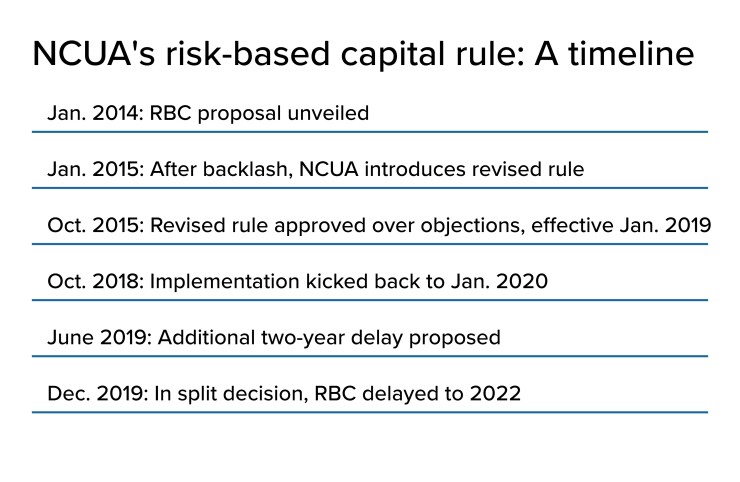It’s often said that those who forget the past are condemned to repeat it. In terms of the

In June, the NCUA board
In the case of federally insured credit unions, if a credit union with greater risk fails, risk-based capital would help to minimize losses to the National Credit Union Share Insurance Fund. That additional money would protect surviving credit unions, their members and taxpayers.
Putting risk-based capital safeguards in place before the next recession is sound public policy. We know that a recession is coming. We just don’t know when and how severe it will be. That’s why we should fix the roof before it rains by implementing this rule at the start of 2020.
With respect to safety and soundness, the NCUA’s supervisory efforts should focus on the institutions and activities posing the greatest risk to the share insurance fund – including concentration risk. The recent
These failed credit unions held significant concentrations of taxi medallion loans on their books – as much as 97% of all loans. According to the
After the Great Recession, the Federal Deposit Insurance Corp. and other banking regulators moved promptly to update and implement their risk-based capital standards. Yet the NCUA wants to delay implementation for a second time. Why should it take complex, federally insured credit unions with $500 million or more in assets seven or eight years longer to implement their comparable risk-based capital rule than it took for banks and thrifts to implement theirs? That’s an uneven regulatory playing field.

Let’s also compare the coverage of the risk-based capital rules for banks to the standards that could be in place for federally insured credit unions at the start of 2020. Approximately nine out of 10 credit unions would be exempt from the NCUA’s current risk-based capital standards. In contrast, not a single bank is exempt from the FDIC’s risk-based capital rule. Since 2014, 100% of banks have complied with those rules.
Capital is the last line of defense that protects the share insurance fund from losses. Capital also protects U.S. taxpayers from having to shore up the fund, as they did during the Great Recession when the NCUA had to ask Congress for a temporary multi-billion dollar line of credit from the U.S. Treasury.
Pursuant to the Basel Accords, which sets international best practices, no modern financial institution’s regulatory system operates without a meaningful risk-based capital component. Not only would the 2015 RBC rule finally bring the NCUA into greater compliance with the Basel framework, it’s required by law in the Credit Union Membership Access Act. That’s why the risk-based capital standard is consistent with the cooperative nature of the credit union system and provides comparability to the other federal banking regulators.
Because the NCUA’s existing risk-based net worth requirement is ineffective, it’s time for the agency to move ahead with the risk-based capital standard. The current risk-based net worth rule is binding on only a single credit union, but the recently delayed rule will apply to approximately 574 credit unions with an estimated $1.2 trillion in assets. That’s nearly 80 percent of the credit union system overall.
As any of these complex credit unions carry out riskier activities, they will be required to hold additional capital equal to that risk. That money will protect the NCUSIF before there is a problem, rather than leading to premium assessments after the fact. Moreover, the additional capital will come from the small number of credit unions with relatively risky balance sheets, not from the vast majority of credit unions with less risky balance sheets who might ultimately pay the price if a second delay is adopted.
In sum, further delay of this much-needed safety-and-soundness standard makes the NCUA a day late in meeting the recommendations of the GAO and our Inspector General, and the share insurance fund a dollar short when yet another credit union is liquidated because it failed to hold capital commensurate with its risks. After a decade of work on a new RBC framework, the Great Recession and the recent taxi medallion CU failures, it is time for us to move ahead to protect taxpayers, federally insured credit unions and their members before it’s too late.





